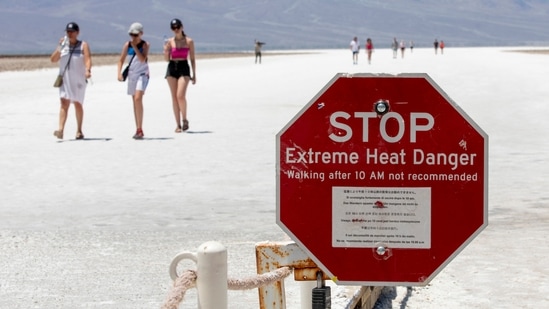Four ‘hottest days ever’, observed during past week, could weaken 'natural systems', warn scientists
At 17.16 degrees Celsius, July 22 is the hottest day in history, followed by July 23, and July 21 and 24 (tied).
The four ‘hottest days ever,’ each of which occurred during the past week, have prompted scientists to warn that the natural systems humans depend on , could ‘collapse' amid soaring temperatures, according to The Washington Post.

Also Read: Life and death in the heat. What it feels like when Earth's temperatures soar to record highs
Since July last year, as per The Post, Earth's average temperature has consistently exceeded 1.5 degrees Celsius (2.7 degrees Fahrenheit) above pre-industrial levels. Scientists say that for the world to avoid the ‘worst consequences' of planetary warming, this ‘short-term’ breach must not be crossed, the report stated.
It is this ‘taste’ of a world with 1.5 degrees Celsius temperature, that shows how the natural systems that support the humankind, could ‘buckle' due to the rising temperatures, said Johan Rockstrom, director of the Germany-based Potsdam Institute for Climate Impact Research.
“The extreme events that we are now experiencing, are indications of the weakening resilience of these (natural) systems,” Rockstrom noted.
Also Read: India reported 40,000 suspected heat stroke cases this summer
Additionally, even as scientists forecast an end to the current stretch of record-breaking heat, they warn that it could be ‘difficult’ to recover from the heat of the past year.
The four ‘hottest days ever’ are…
Data from the Copernicus Climate Change Service, the climate monitor in Europe, shows that the streak began on July 21, with the day's average global temperature beating the record set a little over a year ago.
Also Read: United Nations asks nations to better prepare, cool the vulnerable as 'extreme heat epidemic' breaks records
The new benchmark, however, was broken the very next day, when the temperatures hit a historic 17.16 degrees Celsius (62.89 degrees Fahrenheit). July 23 follows as the second hottest day in history, while July 24 is tied with July 21 in the third spot.
“We are running out of metaphors to describe the unrelenting pace and scale at which the world is breaking records,” remarked Copernicus director Carlo Buontempo, adding that the planet has turned into a ‘helium balloon drifting inevitably upward.’






